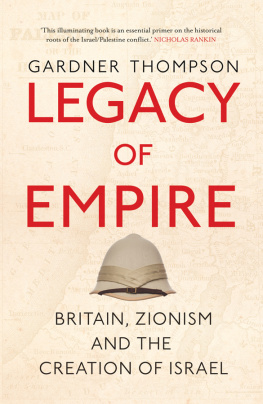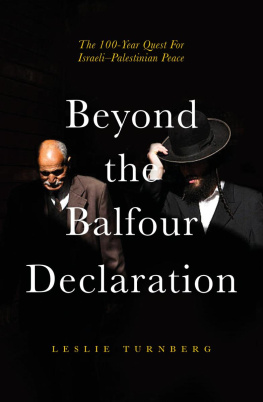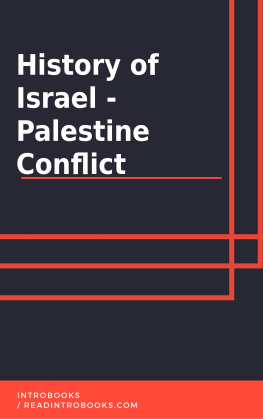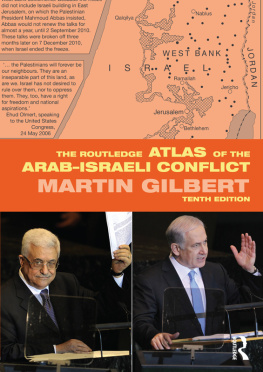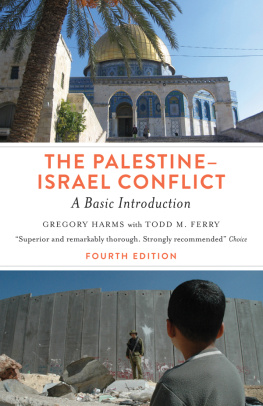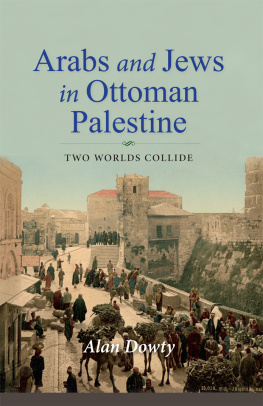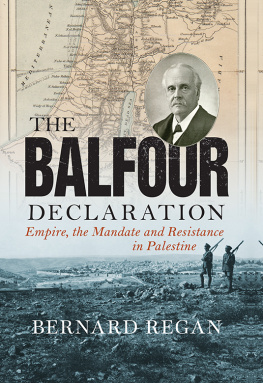Contents
Guide
LEGACY OF EMPIRE
GARDNER THOMPSON
LEGACY
OF
EMPIRE
Britain, Zionism
and the Creation of Israel

To Elizabeth and Ed
Saqi Books
26 Westbourne Grove
London W2 5RH
www.saqibooks.com
Published 2019 by Saqi Books
Copyright Gardner Thompson 2019
Gardner Thompson has asserted his right under the Copyright, Designs and Patents Act, 1988, to be identified as the author of this work.
Illustration of Sir John Robert Chancellor by Hugh Cecil (Hugh Cecil Saunders) cream-toned matte bromide print on cream mount, 1930s reserved; collection National Portrait Gallery, London.
This book is sold subject to the condition that it shall not, by way of trade or otherwise, be lent, resold, hired out, or otherwise circulated without the publishers prior consent in any form of binding or cover other than that in which it is published and without a similar condition including this condition being imposed on the subsequent purchaser.
ISBN 978 0 86356 361 4
eISBN 978 0 86356 386 7
A full cip record for this book is available from the British Library.
Printed and bound by CPI Group (UK) Ltd, Croydon CR0 4YY
CONTENTS
MAPS
ILLUSTRATIONS
SELECTIVE TIMELINE
1896 | Publication of The Jewish State, by Theodor Herzl |
1897 | First Zionist Congress, Basel. Basel Programme |
1914 | First World War begins |
1917 | August: The Montagu Memorandum |
1917 | November: The Balfour Declaration |
1918 | First World War ends |
1919 | Report of the King-Crane Commission |
1920 | Disturbances |
1921 | Disturbances |
1922 | Churchills White Paper. League of Nations Mandate for Britain to administer Palestine |
1923 | Jabotinsky writes The Iron Wall |
1929 | Major disturbances: Year Zero |
1930 | Passfields White Paper (followed by MacDonalds Black Letter, 1931) |
1933 | Hitler and Nazis come to power in Germany |
1936 | Arab Revolt v increasing Jewish immigration and settlement (and British administration) |
1937 | Peel Commission Report. Resumption of Arab Revolt |
1938 | Conference on Political Refugees, Evian, France |
1939 | MacDonalds White Paper |
1939 | Second World War begins
Holocaust/Final Solution |
1942 | Biltmore Programme |
1945 | Second World War ends |
1947 | Britain announces it will abandon Palestine. UNSCOP Report UN votes for partition |
1948 | State of Israel is declared: First Arab-Israeli War |
INTRODUCTION
The two great evils which menace society in general and a society of nations in particular are hatred and ignorance. Chaim Herzog
The Arab-Israeli conflict continues. At the time of writing, there is no peace process and no sign of resolution. We are repeatedly reminded of this. The May 2018 celebration of the seventieth anniversary of the declaration of the state of Israel was marked by renewed Palestinian resistance, and bloodshed, in Gaza. Confusion persists, too. The British Labour Party has struggled to distinguish anti-Zionism and anti-Semitism.
On the shelves of booksellers there is no shortage of works on this subject. But much ignorance remains: of the origins of the modern state of Israel, and of the inter-communal antagonism that marked its birth. There is little knowledge of modern political Zionism, little awareness of the British Empires historic responsibility for Palestine, and little appreciation of the legacy for Israel.

The modern state of Israel was proclaimed in May 1948, just three years after the end of the Second World War. Many assume a direct link between the two events, and of course there was one. Jewish survivors of the horror of Nazi-occupied Europe wanted to start new lives in the only place likely to welcome them, and Palestine presented itself as just that. Tens of thousands of Jews made their way there. But Israels origins are properly sought in the period of the First World War, not the Second.
It is sometimes argued that it is impossible to consider the political affairs of the Jewish people before the Second World War, except in the shadow of our knowledge of what occurred then. But the reverse is also true. We cannot properly consider post-war developments without a secure grasp of what went before: above all, the worsening conflict between indigenous Palestinians and the increasingly militant Zionist movement. This eventually led the British who from 1922 had administered Palestine under a League of Nations mandate to admit failure: provisionally before the war, in 1937; formally after it, in 1947.
It was the British who in 1917 committed themselves, owing to wartime exigency, to the Zionist project. In the 1920s and 1930s, despite evidence, argument and warnings, they oversaw the colonisation of Arab Palestine by Jewish immigrants: a trickle in the 1920s, a flood in the 1930s. There arose, as a result of Britains policy, outright hostility between the peoples, which its administration could not reverse. The British abdicated in 1947 but the conflict was inherited by Israel, after the United Nations awarded 55 per cent of the land of Palestine to a Jewish state in 1947 (to this extent fulfilling the Zionist dream). At heart it is this dispute that continues.
This is not a story of the inevitable. The British might not have done what they did in 1917 and the 1920s, especially under a prime minister other than David Lloyd George. A solution to the Jewish Question how should Jews respond to anti-Semitism generally, though especially in Poland and Russia? might have been found in a continuing welcome for Jewish refugees in Britain and the USA, for example, rather than in the colonisation of an Arab territory of the former Ottoman Empire in the Middle East. The initial British endorsement of Zionism was not inevitable; but its consequences flowed with a certainty like fate.

Britains critical role began with the Balfour Declaration. In November 1917, the British government of Lloyd George pledged to facilitate the establishment in Palestine of a national home for the Jewish people, while stressing that nothing shall be done to prejudice the rights of existing communities living there. In making these two contradictory promises, the Declaration enshrined in a League of Nations mandate in 1922 committed the British administration to a policy that was seen to fail before the Second World War and led to the ignominy of abdication shortly after it.
Balfours Declaration was not the pure expression of sympathy with the aspirations of persecuted Jews that it is still widely held to have been. Far from it. In fact, the only Jewish member of the British Cabinet, Edwin Montagu, condemned his governments attitude to Palestine and Zionism in 1917 as anti-Semitic. The fantastic assumption that lay behind this commitment to Zionism that world Jewry was an agency so powerful that it could not be ignored was itself indicative of an anti-Semitism well established in Central Europe. And this was the same Arthur Balfour who, as Prime Minister, had introduced the Aliens Act in 1905: primarily to prevent Jews who were fleeing persecution in Eastern Europe from entering Britain.

